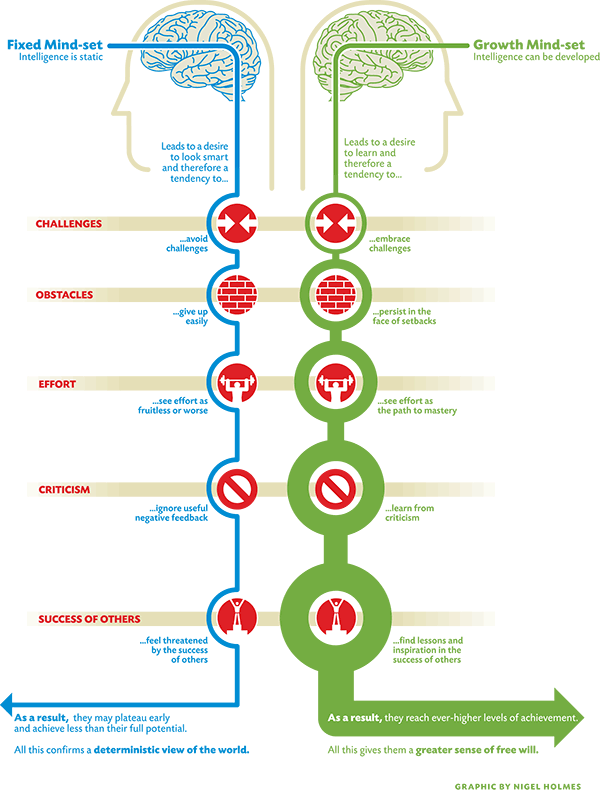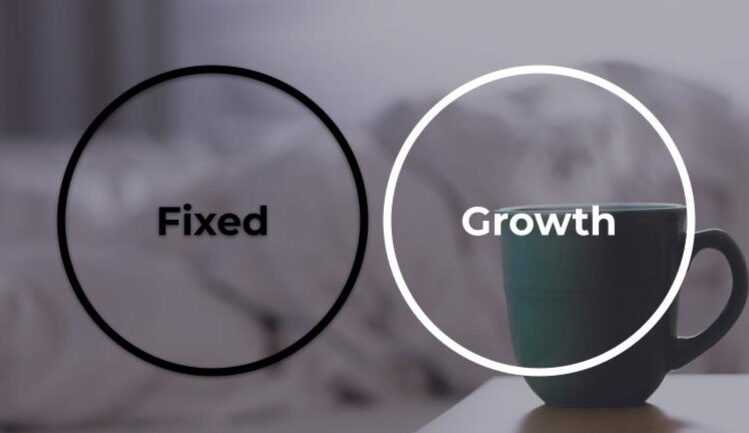Shifting your mindset from fixed to growth may be exactly what you need to achieve what you’re capable of.
We all have a voice in our heads that’s constantly talking to us. Often, this voice is negative, it reminds us we can’t do something, we’re not good enough and so on. This is the voice of the fixed mindset.
What is Mindset?
There are two types of people in this world, those who think they can and those who think they can’t. They are both right — Henry Ford
Your mindset is the set of beliefs and ideas that shape how you view the world. It influences how you think, feel, and behave in any given situation. We think we see the world as it is, but we actually see it as we are. if your mindset is negative, your reality will be negative. In contrast, if you have a positive outlook, you’ll make the most of any given situation.
Fixed vs Growth

In her book, “Mindset: The New Psychology of Success”, Stanford University Psychologist Dr Carol Dweck explains that there are two mindsets: fixed and growth. These can be applied to any situation.
A fixed mindset assumes that our intelligence and creativity are fixed. The genetic lottery deals us a hand in life and we have to accept it. On the other hand, a growth mindset is based on the idea that our talents and abilities can be developed through our efforts. It assumes that everyone can change and grow through experience and practice.
Believing that your qualities are set in stone creates a desire to prove yourself over and over again. You want to look and feel smart so you avoid challenges that might expose your weaknesses. People with fixed mindsets tend to ignore feedback, or even worse, take it as an insult. As a result. These people plateau early and end up stagnating in their careers and life.
With a growth mindset, the desire is not to look smart but to be smart. And the way you get smarter is by embracing challenges, failing and learning from those challenges. This mindset sees a bigger obstacle as a bigger learning opportunity. These people welcome feedback and as a result, they gain much higher levels of achievement and also just satisfaction in life.
It’s Supposed to be Difficult!
One of the attitudes of the fixed mindset is things shouldn’t be hard. We mistakenly believe that if we’re capable of doing a task then we should find it easy. No! It’s supposed to be hard! If it wasn’t then everyone would be doing it. This misconception arises because we see other people’s results but only our own efforts. We only see the effortless match-winning goal, not the thousands of hours of practice that went into making it look so easy.
This realisation drastically changed my own life. During my engineering degree, I hated assignments that involved programming. I found it extremely difficult and I thought I simply had no talent for coding, so I gave up on it. Then I made the realisation that it was supposed to be difficult at first! You have to be a clueless beginner before you can be an effortless master. Having to put in so much extra effort wasn’t evidence of my stupidity, it was proof that I was learning. A couple of years later, I now work as a software engineer; I get paid to do the thing I thought I couldn’t do at all. Getting to this point wasn’t easy, but it all started with the mindset shift.
Think of an area where you’re struggling. If you’re a student, maybe it’s that one module that you just don’t seem to get. Perhaps you hate public speaking and avoid it as much as possible. Which mindset are you adopting?
How to Change Your Mindset
Listen to yourself
We all have a voice in our heads that’s talking to us constantly. The aim of this voice is to protect us against harm by keeping us in our comfort zone.
Can you hear this voice questioning your skills? When you think about taking on a new challenge, does that voice give you all the reasons you shouldn’t do it or all the reasons you should? Self-awareness is the starting point to changing your mindset.
Recognize your power to choose
When that voice says something negative, you don’t have to take it on board, it’s only a suggestion. Setbacks are inevitable in life, but the way that you respond makes all the difference between success and failure.
Embrace discomfort
A comfort zone feels great, but very little growth happens there. When you get out of your comfort zone, you move into the learning zone. Taking on new challenges is not easy, but nothing worth doing ever is.
Take positive action
When the fixed mindset voice tells you to do something, try to do the opposite. Luckily, having a growth mindset is a skill that you can develop. When you practice thinking and acting in a mindset of growth, it becomes easier to tackle obstacles in a more positive way. Every time you use the growth mindset, that growth voice in your head becomes a little louder the next time you’re faced with a challenge.
External Influences on Mindset
Dweck and her team conducted an experiment with 400 students who were all asked to complete a maths test. They were then divided into two equal groups and given a puzzle. When finished, the children in one group were praised for their intelligence (promoting a fixed mindset). The other group received praise for their effort (promoting a growth mindset).
The students were then asked to submit another test. This time they had a choice between a more difficult test and a simpler test (both were actually of a similar difficulty to the first test). Only one-third of the children who had been praised for their intelligence chose the difficult test. In contrast, 90% of the children praised for their effort chose the more complicated test.
On average, the group praised for their intelligence scored 20% lower on the second test. In contrast, the group praised for their effort scored 30% higher. The children whose intelligence was praised did not want to risk losing their smart tag and thus chose the simple test to prove their ability instead of challenging themselves. The group that was praised for their effort tried even harder and achieved more.
This study shows how profoundly others can influence our mindset. When giving feedback, it’s important to praise people’s efforts to reinforce the growth mindset. We should also be careful of tying our own self-worth to our results, instead of effort. Other people may only see the results and misattribute our success to talent, but we can only guarantee effort.








[…] or a job we’ve held. Intangible items are personality traits: your problem-solving ability, mindset confidence and leadership, […]
[…] The passion hypothesis can push us into a fixed mindset. We end up believing that passion should come with ease and that a “dream job” is waiting out there waiting for us. This mindset can cause career stagnation. Read more here. […]